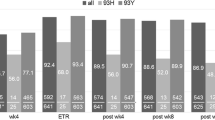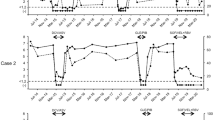Abstract
Background
Little real-world cohort data has been reported for Asians who have received interferon-free regimens with sofosbuvir (SOF) for chronic hepatitis C virus (HCV) infection. We evaluated the effectiveness and safety in clinical practice of ledipasvir (LDV) plus SOF for Japanese patients infected with HCV genotype 1.
Methods
This large, multicenter, real-world cohort study consisted of 772 patients treatment-naive or -experienced, with or without compensated cirrhosis, who were treated with LDV (90 mg)/SOF (400 mg) for a fixed 12-week duration. Direct sequence analysis of the NS5A genes (L31 and Y93) was performed at baseline.
Results
Almost all (99.6%) were infected with HCV genotype 1b. The overall sustained virological response 12 weeks after the end of treatment (SVR12) rate was 98.8% (763/772). Multivariable logistic regression analysis extracted male (odds ratio [OR] 6.62, p = 0.024), cirrhosis (OR 20.1, p = 0.0054), and baseline NS5A resistance-associated variants (RAVs) (OR 29.3, p = 0.0018) as independently associated with treatment failure. Notably, the SVR12 rate for cirrhosis patients with baseline NS5A RAVs (87.5%, 49/56) was statistically lower than for the other groups. This tendency was found except for patients with prior daclatasvir/asunaprevir failure. All patients with treatment failure had NS5A Y93H at relapse, whether or not they had NS5A RAVs at baseline. Serious adverse effects were very rare, and discontinuation was required for only five (0.6%) patients.
Conclusions
LDV/SOF for HCV genotype 1b was exceptionally effective, however, NS5A RAVs undermined the virological effect for cirrhosis patients. Moreover, LDV/SOF was shown to be safe, irrespective of age or fibrosis status.

Similar content being viewed by others
Abbreviations
- HCV:
-
Hepatitis C virus
- PEG-IFNα:
-
Pegylated interferon alpha
- DAAs:
-
Direct-acting antivirals
- SOF:
-
Sofosbuvir
- LDV:
-
Ledipasvir
- SVR:
-
Sustained virological response
- RAVs:
-
Resistance-associated variants
- eGFR:
-
Estimated glomerular filtration rate
- IL28B:
-
Interleukin-28B
- OR:
-
Odds ratio
- CI:
-
Confidence interval
- ASV:
-
Asunaprevir
- DCV:
-
Daclatasvir
- RVR:
-
Rapid virological response
- ALT:
-
Alanine aminotransferase
- PPI:
-
Proton-pump inhibitor
References
Chung H, Ueda T, Kudo M. Changing trends in hepatitis C infection over the past 50 years in Japan. Intervirology. 2010;53:39–43.
Hadziyannis SJ, Sette H Jr, Morgan TR, et al. Peginterferon-alpha2a and ribavirin combination therapy in chronic hepatitis C: a randomized study of treatment duration and ribavirin dose. Ann Intern Med. 2004;140:346–55.
Poynard T, McHutchison J, Manns M, et al. Impact of pegylated interferon alfa-2b and ribavirin on liver fibrosis in patients with chronic hepatitis C. Gastroenterology. 2002;122:1303–13.
Furusyo N, Kajiwara E, Takahashi K, et al. Association between the treatment length and cumulative dose of pegylated interferon alpha-2b plus ribavirin and their effectiveness as a combination treatment for Japanese chronic hepatitis C patients: project of the Kyushu University Liver Disease Study Group. J Gastroenterol Hepatol. 2008;23:1094–104.
Ogawa E, Furusyo N, Kajiwara E, et al. Evaluation of the adverse effect of premature discontinuation of pegylated interferon α-2b and ribavirin treatment for chronic hepatitis C virus infection: results from Kyushu University Liver Disease Study. J Gastroenterol Hepatol. 2012;27:1233–40.
Afdhal N, Reddy KR, Nelson DR, et al. Ledipasvir and sofosbuvir for previously treated HCV genotype 1 infection. N Engl J Med. 2014;370:1483–93.
Kowdley KV, Gordon SC, Reddy KR, et al. Ledipasvir and sofosbuvir for 8 or 12 weeks for chronic HCV without cirrhosis. N Engl J Med. 2014;370:1879–88.
Mizokami M, Yokosuka O, Takehara T, et al. Ledipasvir and sofosbuvir fixed-dose combination with and without ribavirin for 12 weeks in treatment-naive and previously treated Japanese patients with genotype 1 hepatitis C: an open-label, randomised, phase 3 trial. Lancet Infect Dis. 2015;15:645–53.
Backus LI, Belperio PS, Shahoumian TA, et al. Real-world effectiveness of ledipasvir/sofosbuvir in 4365 treatment-naive, genotype 1 hepatitis C-infected patients. Hepatology. 2016;64:405–14.
Ioannou GN, Beste LA, Chang MF, et al. Effectiveness of sofosbuvir, ledipasvir/sofosbuvir, or paritaprevir/ritonavir/ombitasvir and dasabuvir regimens for treatment of patients with hepatitis C in the veterans affairs national health care system. Gastroenterology. 2016;151:457–71.
Ogawa E, Furusyo N, Toyoda K, et al. The longitudinal quantitative assessment by transient elastography of chronic hepatitis C patients treated with pegylated interferon alpha-2b and ribavirin. Antiviral Res. 2009;83:127–34.
Vallet-Pichard A, Mallet V, Nalpas B, et al. FIB-4: an inexpensive and accurate marker of fibrosis in HCV infection. Comparison with liver biopsy and fibrotest. Hepatology. 2007;46:32–6.
Sterling RK, Lissen E, Clumeck N, et al. Development of a simple noninvasive index to predict significant fibrosis in patients with HIV/HCV coinfection. Hepatology. 2006;43:1317–25.
Ogawa E, Furusyo N, Kajiwara E, et al. Comparative effectiveness and safety study of triple therapy with simeprevir or telaprevir for non-cirrhotic patients with chronic hepatitis C virus genotype 1b infection. J Gastroenterol Hepatol. 2015;30:1759–67.
Ogawa E, Furusyo N, Yamashita N, et al. Effectiveness and safety of daclatasvir plus asunaprevir for HCV genotype 1b patients aged 75 and over with or without cirrhosis. Hepatol Res. 2016. doi:10.1111/hepr.12738.
Ogawa E, Furusyo N, Nomura H, et al. Effectiveness and safety of sofosbuvir plus ribavirin for HCV genotype 2 patients 65 and over with or without cirrhosis. Antiviral Res. 2016;136:37–44.
HCV Guidance: recommendations for testing, managing, and treating hepatitis C. AASLD and IDSA. http://www.hcvguidelines.org. Accessed 9 Sept 2016.
European Association for the Study of the Liver. EASL recommendation on treatment of hepatitis C 2016. J Hepatol. 2016. doi:10.1016/j.jhep.2016.09.001.
Sarrazin C, Dvory-Sobol H, Svarovskaia ES, et al. Prevalence of resistance-associated substitutions in HCV NS5A, NS5B, or NS3 and outcomes of treatment with ledipasvir and sofosbuvir. Gastroenterology. 2016;151:501–12.
Mizokami M, Dvory-Sobol H, Izumi N, et al. Resistance analyses of Japanese hepatitis C-infected patients receiving sofosbuvir or ledipasvir/sofosbuvir containing regimens in phase 3 studies. J Viral Hepat. 2016. doi:10.1111/jvh.12549.
Tapper EB, Bacon BR, Curry MP, et al. Evaluation of proton pump inhibitor use on treatment outcomes with ledipasvir and sofosbuvir in a real-world cohort study. Hepatology. 2016. doi:10.1002/hep.28782.
Acknowledgements
We are grateful to Drs. Masayuki Murata, Kazuhiro Toyoda, Motohiro Shimizu, Takeo Hayashi, Fujiko Mitsumoto-Kaseida, Koji Takayama, Kazuya Ura, Yoshifumi Kato, Yuuki Tanaka, and Sho Yamasaki from the Department of General Internal Medicine, Kyushu University Hospital for their assistance with data collection for this study. We are also grateful to Yoshitaka Etoh for his excellent lab work on IL28B SNPs and RAVs testing.
Author information
Authors and Affiliations
Consortia
Corresponding author
Ethics declarations
Conflict of interest
Norihiro Furusyo has received grants from Taisho Toyama Pharmaceutical Co., Ltd., Daiichi Sankyo Co., Ltd., Janssen Pharmaceutical K.K., and Bristol-Myers Squibb. Makoto Nakamuta has received grants from Bristol-Myers Squibb. The other authors declare that they have no conflicts of interest. This study received no specific funding.
Rights and permissions
About this article
Cite this article
Ogawa, E., Furusyo, N., Nomura, H. et al. NS5A resistance-associated variants undermine the effectiveness of ledipasvir and sofosbuvir for cirrhotic patients infected with HCV genotype 1b. J Gastroenterol 52, 845–854 (2017). https://doi.org/10.1007/s00535-016-1290-1
Received:
Accepted:
Published:
Issue Date:
DOI: https://doi.org/10.1007/s00535-016-1290-1




